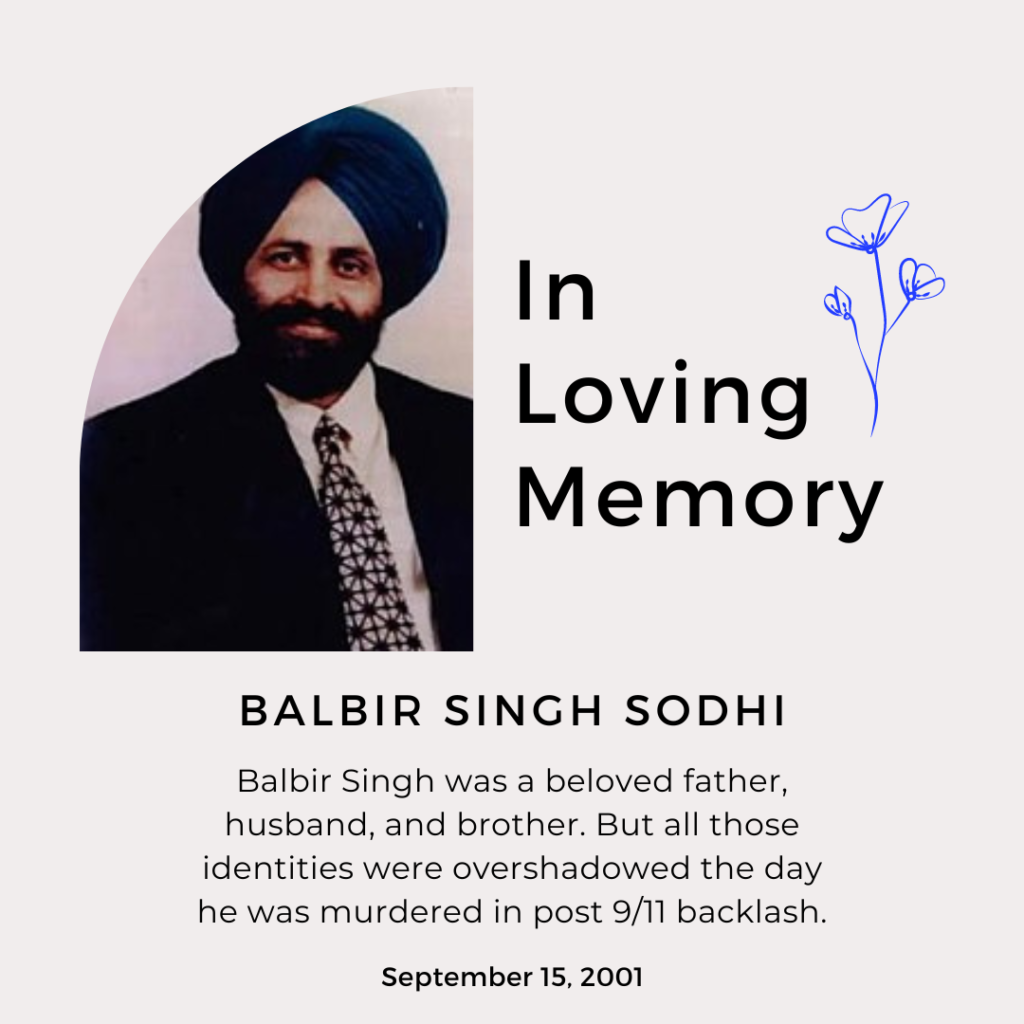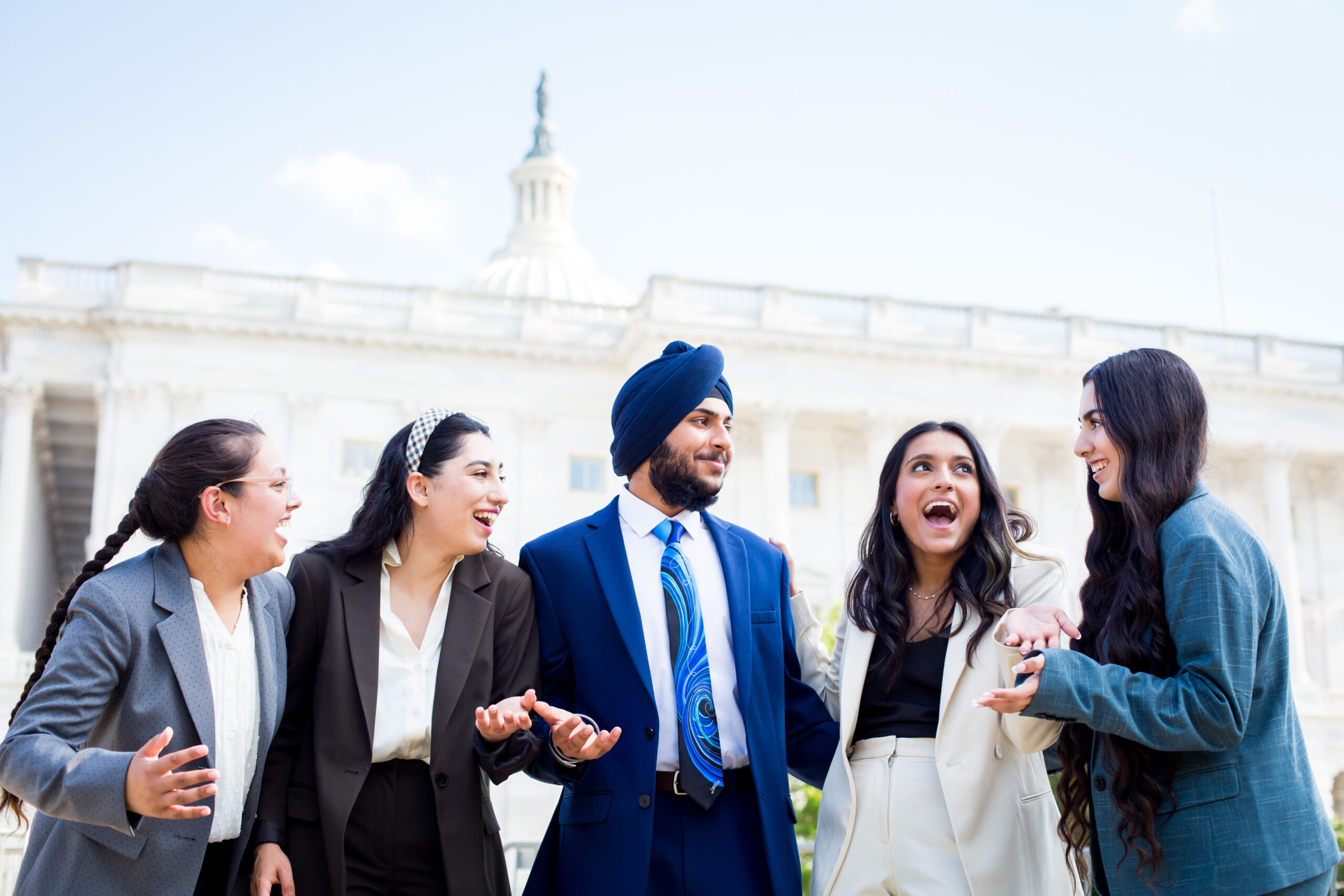Remembering Balbir Singh Sodhi

The Story of Balbir Singh Sodhi: The First 9/11 ‘Backlash’ Fatality
Balbir Singh Sodhi was shot and killed on Saturday, September 15, 2001 in Arizona by Frank Roque. Mr. Roque wanted to “kill a Muslim” in retaliation for the attacks on September 11. It was the first fatal act of hate violence resulting from 9/11. Mr. Roque was convicted of first degree murder and sentenced to life in prison for the hate crime. Just a few months before the tenth anniversary of his death and the attack on America, the Arizona legislature decided to remove Mr. Sodhi’s name from the state 9/11 memorial because he was not deemed “a victim of 9/11″. After advocacy by community groups, Governor Jan Brewer would veto the bill and continue to honor the memory of Mr. Sodhi.
The events of September 11, 2001, affected each and every American in pointed and distinct ways. Many thousands perished during the attack, others lost loved ones. Many reacted with fervent patriotism for their country in order to overcome the devastation in progressive and constructive ways, while others lashed out with fear and hate towards the unknown and who they perceived to be ‘the enemy’. Despite the myriad of reactions to that day, it is clear that the tragedy and loss of 9/11 did not end on that fateful Tuesday. The aftermath is still very real for the families of those that were lost in the attacks, for the families of those that were attacked in the backlash, and those that still fear for their safety in America.
Mr. Sodhi was a 49 year old Sikh American man, who owned a Chevron gas station in Mesa, Arizona. He was shot while arranging American flags in front of his gas station. His assailant, Frank Roque, wanted to ‘kill a Muslim’ in retaliation for the terrorist attacks. He selected Mr. Sodhi simply because he had a beard and wore a turban in accordance with his Sikh faith. Mr. Roque shot at Mr. Sodhi three times, then shot at another service station owned by a Lebanese American, and finally shot at a home of a family of Afghan descent. Fortunately, no one else was injured.
Balbir Singh Sodhi was the oldest of five brothers. Mr. Sodhi immigrated to the United States from India in 1988 to realize the American dream. He joined his brother Harjit Sodhi in Los Angeles, CA, where he worked at a 7-Eleven for several years until he moved to Walnut Creek, CA to become a cab driver. He had moved to Mesa a year prior to his death, bought a house, and the gas station across the street. “He worked 12, 14 hours a day,” said his brother Harjit, “and he saved his pennies.” He regularly sent money to his family still in India. Jagjit Sodhi, his older brother, stated, “We depended on the money he sent us from time to time.” After hearing about his younger brother’s tragic death, he was shocked: “He could never have any enemy. He is innocent.” Mr. Sodhi was a husband and a father of two daughters. Mr. Sodhi was “known by friends and neighbors as a quiet, gentle man….Children have told reporters how Balbir Singh would let them buy candy from his store, even if they didn’t have enough money. The homeless shed tears as they recounted tales of his generosity to them.” Many Arizona state representatives and citizens of all backgrounds rallied around the Sodhi family and the Sikh American community in support, with over 3,000 people attending Mr. Sodhi’s memorial service.
The day after the attack, Arizona Attorney General Janet Napolitano held the first of many press conferences. She said, “we will not tolerate acts of bigotry against our fellow Arizonans.” “No individual should have to be afraid of their safety because of the color of their skin, the way they dress or the religion they choose to practice.” She encouraged the state to honor his memory. In 2006, the Arizona legislature unveiled a memorial to the victims of 9/11 which included the name of Balbir Singh Sodhi. Mesa’s Mayor, Keno Hawker, firmly stood against such hate-motivated attack, saying “senseless acts of violence will do nothing to help our nation heal or bring peace to the victims of the horrific tragedy that occurred this week…now is the time for all Mesa resident to display solidarity by taking a clear stand against violence. We are all Americans. We are all grieving. Let us unite in peace and determination that violence will never be the answer.” At the memorial service, Maricopa County Attorney, Rick Romley, stated: “On September 11, America was attacked from abroad. However, with the murder of Mr. Sodhi, we have now been attacked from within.”
Frank Roque boasted during his arrest: “I’m a patriot.” “I stand for America all the way.” “Two years later, he learned the American way included a fair trial by jury. On September 30, 2003, an Arizona jury found Frank Roque guilty of first-degree murder for his hate crime murder of Mr. Sodhi, along with five other charges, including attempted murder and reckless endangerment related to drive-by shootings at other individuals he perceived to be Middle Eastern that same day in 2001. On October 9, 2003, Frank Roque was sentenced to the death penalty. The sentence was later commuted to life in prison.
In 2011, the state of Arizona proposed a bill to remove Balbir Singh Sodhi’s name from the state’s 9/11 Memorial. The bill’s original sponsor, Rep. John Kavanaugh (R), claimed that Sodhi was “not a victim of 9/11.” Adding insult to injury, along with stripping the late Mr. Sodhi’s name from the memorial, the legislation even enumerated that the removed plaque to be sold to a scrap metal dealer. Ten years after 9/11, Rep. Kavanaugh stated, “It’s part of a myth that, following 9/11, Americans went into a xenophobic rage against foreigners. That’s not true. America’s reaction towards foreigners was commendable.” Following a wave of local and national outcry, Governor Jan Brewer vetoed the bill on April 29, 2011. The bill, which passed both Houses on party lines, would have automatically gone into effect on May 2, 2011.
